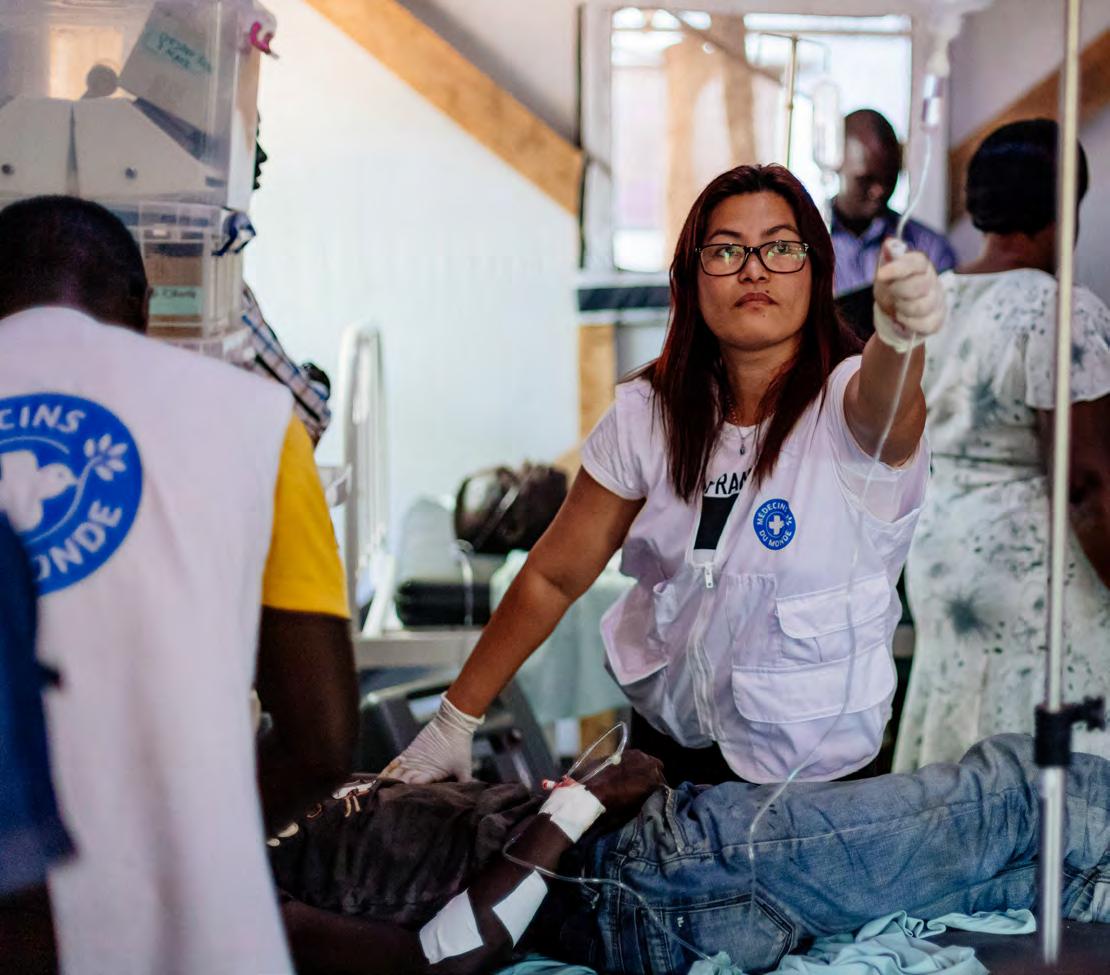
3 minute read
POOLING RESOURCES
In order to increase the reach of its actions, provide better support for social change and also reduce its investments, MdM continues to sign up to a range of partnerships, consortia and other resource-sharing arrangements bringing together a variety of different organisations. MdM and its partners are undertaking in-depth work on programmes, advocacy, training, assessment, etc. Synergies, Réseau Logistique Humanitaire and Alliance Urgences are three examples of this collaborative approach.
SYNERGIES
Advertisement
Synergies is a collaboration mechanism which is in the process of being created by Humanity & Inclusion, MdM, Première Urgence Internationale and Solidarités International. This alliance intends to respond to the rapid changes seen in the humanitarian sphere in recent years, in order to provide a better and faster response to the needs of populations impacted by crisis.
The collaboration will draw on the strengths and areas of expertise of each partner, with different sectors complementing each other, to maximise the impact of the actions taken. It will also promote the pooling of costs, mutual assistance and information-sharing in order to be more efficient collectively.
Finally, the plan is to launch new methods of cooperation to enhance access in the field through a model whereby one organisation hosts another. The next steps in the process are to sign the partnership agreement in spring 2020 and organise the financing of a pilot project in the Central African Republic to test the strength of the mechanism.
RÉSEAU LOGISTIQUE HUMANITAIRE
Réseau logistique humanitaire (Humanitarian Logistics Network) is a consortium founded in 2014. Its main aim is to optimise humanitarian aid logistics and improve operational efficiency by developing a joint strategy based on resource-sharing, advocacy and information-sharing.
The Network currently brings together eleven international aid organisations: Action Contre la Faim, Humanity & Inclusion, SOL, Première Urgence Internationale, Medair, Terre des hommes, Oxfam Intermon, La Chaîne de l’Espoir, Acted, the French Red Cross and MdM. Represented by these organisations’ presidents and logistics directors, the Network also provides a forum for sharing information and best practices in terms of humanitarian logistics.
In 2019, a joint document on optimisation in humanitarian logistics ("Strength in Numbers") was published in a variety of media and presented to key donors. A feasibility study is currently being carried out regarding the network’s logistics pooling capacities, its scope for action, the forms it might take and benefits it could bring. In addition, various working groups have been set up to develop and optimise practices linked to humanitarian logistics.
ALLIANCE URGENCES
Alliance Urgences (Emergencies Alliance), a consortium of six French humanitarian organisations (Action Contre la Faim, CARE France, Handicap International, MdM, Plan International and Solidarités), was created in 2019.
These organisations, all involved in activities in the field, now speak with a single voice in response to humanitarian emergencies in order to encourage public generosity as widely as possible.
In the event of armed conflict, natural disasters, epidemics or famine, calls for donations are made repeatedly during the very first hours of a humanitarian emergency. This leads to the kind of acts of generosity that are vital for the work carried out by NGOs. However, it is important for the sector to speak with one voice if the needs of the victims are to be heard and met as quickly as possible. This is what Alliance Urgences strives to achieve. Strengthened by a range of different experiences and expertise (in nutrition, healthcare, first aid, shelter, access to water, protection of those most at risk and providing access to education), the six humanitarian organisations which form Alliance Urgences are committed to acting as fast as possible to provide relief to civilian populations suddenly exposed to multiple risks.
All donations made to Alliance Urgences and redistributed to the various member NGOs active in the field therefore help to fund the different elements of an emergency response and, through pooling, reduce the cost of fund-raising campaigns targeting the general public.








